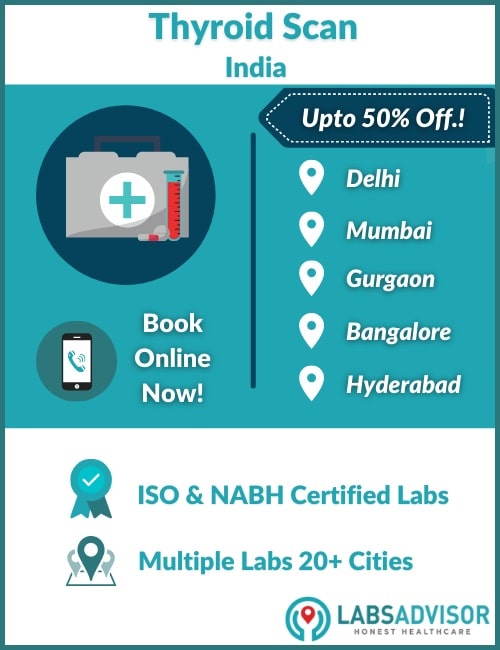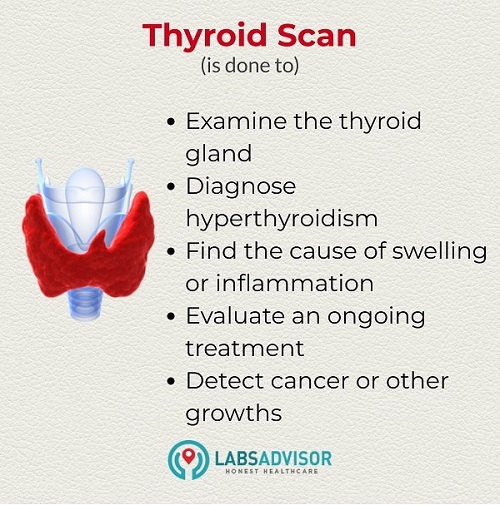
A Thyroid Scan is a special imaging test that uses a radioactive tracer and a special camera to measure how much tracer the thyroid gland absorbs. Depending upon the type of scan the radioactive tracer is either injected into the body, swallowed, or inhaled as a gas.
Book your thyroid scan near you at your local top-quality labs through us at up to a 50% discount. The lowest Thyroid scan cost in India is ₹900 only.
Thyroid Scan in India Through LabsAdvisor
|
Thyroid Scan Cost in India and Lab Details
Below is the list of the cities providing Thyroid scan costs in India, please click on the link of the city you want and you can see all the labs near you and book online.
You can also select the time slot suitable for your Thyroid scan. Click on the preferred link below to book anytime, 24 hours a day.
| Thyroid Scan in India | Prices Starting From |
| Thyroid Scan Price in Delhi | ₹3200 |
| Thyroid Scan Price in Noida | ₹3200 |
| Thyroid Scan Price in Gurgaon | ₹3200 |
| Thyroid Scan Price in Hyderabad | ₹900 |
| Thyroid Scan Price in Bangalore | ₹2250 |
| Thyroid Scan Price in Mumbai | ₹2850 |
| Thyroid Scan Price in Ahmedabad | ₹3800 |
| Thyroid Scan Price in Kolkata | ₹2340 |
| Thyroid Scan Price in Other Indian Cities | ₹900 |
If your Thyroid scan is not listed in the table above, call us on +918061970525. We will get back to you with the Thyroid scan cost near your location in India.
Get the lowest Thyroid scan cost in India by calling us at
If you want us to call you back, click on the link below
What is a Thyroid Scan?
A Thyroid Scan is a special imaging test that uses a radioactive tracer and a special camera to measure how much tracer the thyroid gland absorbs. Depending upon the type of scan the radioactive tracer is either injected into the body, swallowed, or inhaled as a gas.
This radio-tracer medicine accumulates in the organ or area to be examined. It will release gamma rays when it is in the body. A gamma scanner or camera can detect how much tracer the thyroid has absorbed from the blood.
A Thyroid gland is a small, butterfly-shaped gland located at the base of the neck. The main function of the thyroid gland is to produce hormones essential for body metabolism (the process of producing and using energy). There are several disorders that can arise when the thyroid gland secretes too much hormone (hyperthyroidism) or not enough (hypothyroidism).
A thyroid scan shows the structure and function of the thyroid gland. It can also find the areas of the thyroid gland that are under or overactive. The camera takes the picture of the thyroid gland from three different angles producing images to provide molecular information.
There is another type of thyroid nuclear medicine test called a Radioactive Iodine uptake test or simply uptake test usually done to see if the thyroid is working normally. RAUI does not involve imaging.

Who is prescribed for a Thyroid scan?
A thyroid scan is usually prescribed when a physical examination or laboratory tests suggest that the thyroid is enlarged or has a lump. If the laboratory test shows an overactive gland, a Thyroid Uptake test may be advised at the same time to evaluate the functioning of the gland.
What are the uses of the Thyroid scan?

The doctor may call for a thyroid scan to:
- Check if the gland is working properly
- Diagnose problems with the thyroid gland, especially the overactive thyroid gland called hyperthyroidism, cancer, or other growths.
- Assess the nodule discovered in the gland
- Find the cause of swelling or inflammation of nodule
- Evaluate changes in the gland following medication, radiotherapy, surgery, or chemotherapy
A whole-body thyroid scan is performed on people with thyroid cancer to determine if cancer has spread beyond the thyroid gland.
How to prepare for the procedure?
If you are pregnant or breastfeeding, then let your doctor know. Radionuclide can harm a developing fetus or nursing baby. The doctor will then prescribe an alternative procedure like an ultrasound for diagnosis.
For a week before the thyroid scan, your doctor may ask you to avoid certain foods and medicine which can interfere with the results. You should inform your doctor if you are taking any vitamins or herbal supplements. Iodized salt, cough syrups, and kelp should be avoided for a few days before the test. You should also inform them if you have any allergies or other medical conditions.
You should inform the doctor if you had any tests using radioactive material or iodine dye (such as a CT scan with contrast) 4 weeks before the scan. These other tests can alter the results of the scan.
You may have a blood test done a few days before the scan to check the level of thyroid hormones in your blood.
You may be told not to eat a few hours before the test. Jewelry or other metallic accessories should be removed as they may interfere with the procedure.
How is the procedure performed?
The thyroid scan procedure can be performed on an outpatient basis or hospitalized patients as well.
Before the thyroid scan, blood tests are usually done to check the amount of secreted thyroid hormones (TSH, T3, and T4) in your blood.
If you are having a thyroid scan only the doctor will give you a radio-tracer by intravenous injection 30 minutes prior to the test. The radioactive tracer used in the test is either iodine or technetium.
When it is time for the imaging, you will be asked to lie down on a movable examination table, with your head a bit tipped backward and neck extended. The gamma camera will take a series of images from three different angles, taking images of the gland.
You need to lie very still while the camera is taking pictures. The camera does not expose you to any radiation. This portion of the test usually takes half an hour.
When the examination is completed, you may be asked to wait while the radiologist checks if additional images are needed. Sometimes, additional images are needed for clarification or better visualization of certain areas or structures.
If you had an intravenous line inserted for radiotracer injection, it will be removed unless you have some other procedure involving an IV line scheduled the same day.
How does it feel during and after the scan?
Most thyroid scan and uptake procedures are painless. You may feel a slight prick when the needle is inserted into an intravenous line. You may also feel a cold sensation moving up your arm when the radiotracer is injected, but there are no side effects of the radiotracer.
When taken by mouth, the radiotracer has little or no taste. When inhaled, the gas doesn’t have any smell or does not cause any irritation.
It may feel a little uncomfortable when the image is being taken as you have to lie very still tilting your head backward.
You may resume your normal activities after the scan. Your doctor may give special instructions to follow if needed.
The radiotracer injected into your body will lose its radioactivity normally over time. It may also be passed out of your body with urine or stool in the first few hours or days of injection. You should drink plenty of water to help your body flush out the radiotracer. It is important to flush the toilet twice every time you use it and wash your hands completely.
What are the risks and limitations of the Thyroid scan?
- Because of a very low dose of radiotracer given, there is very feeble radiation exposure to the patients. The risk of radiation is relatively very low as compared to the benefit of the test.
- The radiotracer may cause an allergic reaction in some patients, although such cases are extremely rare. You should inform the doctor of any allergies you have or experienced any reaction to your previous nuclear medicine test.
- Injection of the radiotracer may cause slight redness or pain which soon disappears.
- A thyroid scan cannot be done on pregnant ladies or breastfeeding mothers.
- The thyroid scan may be time-consuming. it may take several hours for the radiotracer to accumulate in the body part to be examined.
- The resolution of images of structures of the body may not be as high as other imaging procedures like CT scans. However, functional information obtained through the nuclear medicine test is often unattainable from other imaging techniques.
Other topics you may be interested in:-
- Thyroid Function Test Cost in India
- MCU Test Cost in India
- Mammography Test Cost in India
- PET CT Scan Cost in Delhi
- Vitamin D Test Cost in India






